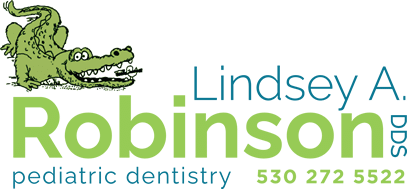Your Questions Answered!
 At what age should my child visit the dentist?
At what age should my child visit the dentist?
Lindsey A. Robinson, DDS in Grass Valley follows the American Academy of Pediatric Dentistry guidelines for a first visit by age 1. Visiting the dentist at an early age sets a positive foundation for a lifetime of dental visits, and helps you understand how to care for baby teeth and what to expect as your baby grows. These first visits not only help your child acclimate to a new environment and feel safe and comfortable, it’s also building a relationship between your family and your pediatric dentist. When a pediatric dental emergency occurs, you and your child will know whom to call and have the security of knowing your doctor.
Early visits to your Grass Valley, CA dentist can also help you identify any problem areas, pathologies or future issues that you may not be aware of, and set the course for your child’s dental health.
What is a pediatric dentist?
A pediatric dentist is a general dentist who has completed additional years of education and training, and has also completed a pediatric-focused residency in a hospital setting. A Board Certified Pediatric Dentist, or Diplomate, is a dentist who demonstrates an exceptional knowledge and expertise at a standard not possessed by other dentists. The certification process determines the proficiency of pediatric dentists using a written examination followed by an oral examination with the American Board of Pediatric Dentistry. Only about 47% of practicing pediatric dentists are board certified.
Why are baby teeth important?
Your child’s baby (primary) teeth help them develop physically, mentally and emotionally.
Physically, your child’s teeth help them chew, and provide placeholders as their permanent teeth grow and develop. If their primary teeth need to be extracted (pulled) before they are ready, it could indicate problems as they grow and when their permanent teeth are ready to erupt.
Your child’s teeth also assist their mental development. As children learn to form sounds, speak and communicate, their tongue, lips, cheeks and teeth are all part of sounding words correctly and learning to express their thoughts. Well-functioning teeth also help a child’s concentration; if they are in pain from a diseased tooth, research shows they perform poorly in school and can also develop other negative behaviors as a result of their discomfort.
We all appreciate a beautiful smile, and children are no different. Emotionally, children can struggle if they have noticeable disease and decayed teeth. Children are less likely to fully smile, and they can develop habits that follow them for a lifetime.
What is the best way to clean baby teeth?
When teeth are first breaking through the skin (erupting), a soft, damp washcloth should be wiped along the gums and teeth. This is especially important if you are nursing; each time you nurse your baby, you should clean their gums and teeth.
When teeth start to become fully erupted, switch to using a soft-bristled toothbrush. You can start using a very small smear of fluoride-free toothpaste on the brush, or none at all. When children are old enough to spit out toothpaste, we recommend switching to a fluoridated toothpaste. Toothpastes that contain xylitol are also highly recommended, as xylitol is a naturally-occurring sweetener that has been found to inhibit decay-causing bacteria in the mouth.
Remember that children need assistance with proper brushing techniques until they are able to accomplish fine motor skills, such as writing in cursive (age 7 or 8).
How much toothpaste should my child use?
For babies without teeth, gently wipe their gums with a damp washcloth or a xylitol wipe after nursing. As soon as teeth appear, decay can occur, so gentle brushing with a soft toothbrush and water after each meal is recommended.
For toddlers over two, start using a pea-sized amount of fluoridated toothpaste during brushing times. Fluoride can upset small tummies, so it’s important that children don’t swallow their toothpaste. Remember that children need assistance with proper brushing techniques until they are able to accomplish fine motor skills, such as writing in cursive (age 7 or 8).
How do I develop good brushing habits?
It’s important to set a good foundation early on (as with any habit). Start by brushing your baby’s teeth twice a day (and wiping their teeth after each time you nurse), and singing fun songs while you brush. Your child may struggle and not enjoy brushing, but it is important that you firmly and gently establish this important habit early.
When children are older, use a brushing chart with stickers that they receive each time they brush. Flossing should start when teeth start touching, generally about age 6 or 7, or depending on how closely spaced your child’s teeth grow in.
Do I need to worry about cavities in baby teeth?
Many people think so, but we are seeing more and more of our younger Grass Valley patients growing up without them.
Why is that? Well, there are a number of factors. Some may be beyond a parent’s control, and others involve lifestyle choices and habits that can be changed through increased awareness and education.
If your child has already had a cavity, chances are that more will occur. That’s because there are probably conditions that allow them to develop. But if you are vigilant, you might be able to avoid a cavity. For instance, a white spot along the gum line can be an indicator that a cavity is forming. We can often help avoid further decay in such cases—through a combined therapy such as fluoride, mouth rinses and changes in eating habits—if we see the patient soon enough.
Another sign is plaque. If you can scrape a fingernail along your child’s front teeth and remove a sticky whitish substance (plaque), your child is at greater risk of forming cavities. We recommend brushing at least twice a day so plaque can’t form. Toothpaste with fluoride helps preserve essential minerals found in teeth. Be careful, though, not to put too much toothpaste on the brush and be sure your child spits it all out.
An effective preventive habit is regular dental checkups. We can assess your child’s risks and help anticipate oral issues. Some children have special health care needs that we can address with special equipment and/or techniques. Others routinely take medications that make them more prone to cavities.
Regular checkups for infants and toddlers allow us to talk about appropriate diet management. Talking directly with older children gives us the chance to find out about their dental behavior and offer suggestions and advice.
My child plays sports — do they need a mouthguard?
Mouthguards can help cushion a blow to the face, minimizing the risk of broken teeth and injuries to your child’s lips, tongue, face or jaw.
When it comes to protecting your child’s mouth, a mouthguard is an important piece of dental equipment, particularly from an early age when the jaw and teeth are still developing. While collision and contact sports, such as boxing, are higher-risk sports for the mouth, you can experience a dental injury in non-contact sports as well. Learn more about protecting your child’s teeth with mouthguards by clicking here.
Schedule an appointment at our Grass Valley, CA Office
Do you have more questions that weren’t answered in our FAQ, or are you ready to schedule an appointment at our Grass Valley CA pediatric dental office? Give us a call today at (530) 272-5522!
